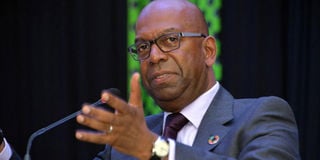Consumer protection means of cutting Safaricom dominance

Safaricom chief executive Bob Collymore at Safaricom House in Nairobi on November 4, 2016. PHOTO | SALATON NJAU | NATION MEDIA GROUP
What you need to know:
In seeking to remedy Safaricom’s dominant player situation, should the objective be to introduce ex-ante abuse of market power or take action on an ex-post basis, when there is clear evidence that consumers are suffering, rather than intervening in advance.
Is what we are dealing with here a case of concentration of economic power, which can be remedied or does this require drastic structural changes where regulators ask the dominant player to split the business into separate companies as happened to AT&T, which was broken up into several pieces in 1984?
I recently came across a report by the consulting group Analysys Mason entitled "A telecommunication competition market study in Kenya". Readers will recall that these consultants were retained by the market regulator – the Communications Authority of Kenya – to conduct a study whose results were to inform the crafting of a new framework for regulating abuse of market dominance by the big players.
As expected, one of the key findings of this study is that Safaricom’s market share in both the mobile communications and mobile money segments far exceed the thresholds where firms are typically presumed to be dominant.
What I find most significant in the report is the scope of the radical changes that the consultants have prescribed for regulation of competition of the telecommunications industry.
A few points to note before going into the substance of the prescriptions. First, we must all agree that Safaricom does not have a serious competitor to talk of today. Its nearest rival, Airtel, has made cumulative debt to date of Sh51 billion, according to latest audited accounts for the financial year 2015. Indeed, in the league of loss makers, only Kenya Airways, with their Sh54 billion lost in the most recent years, compares to Airtel. As a matter of fact, the numbers in the company’s annual accounts show that Airtel is insolvent and only surviving on life support from the parent company in India. Safaricom’s only other rival, Orange Telkom, has gone through exceedingly difficult trading and financial conditions over the past decade. This a firm that is technically insolvent. It has gone through several episodes of restructuring that have not materially changed its circumstances.
EQUITY FUND
France Telecom, which has been the dominant shareholder since the firm was privatised in 1998, recently sold to the private equity fund Helios. Which begs the question: Should the objective of regulation be to protect competition or these weak and insolvent competitors?
In seeking to remedy Safaricom’s dominant player situation, should the objective be to introduce ex-ante abuse of market power or take action on an ex-post basis, when there is clear evidence that consumers are suffering, rather than intervening in advance. Is what we are dealing with here a case of concentration of economic power, which can be remedied or does this require drastic structural changes where regulators ask the dominant player to split the business into separate companies as happened to AT&T, which was broken up into several pieces in 1984?
In my view, regulation of market dominance should concentrate on what is known in jargon as “conduct remedies” such as restrictions on product bundling, price discrimination and exclusionary practices.
In a backdrop where Safaricom has weak and insolvent competitors, regulation of market dominance can only make sense where the focus is on consumer protection. The most draconian of the prescriptions is the proposal to functionally separate M-Pesa from Safaricom. This is tantamount to proposing a break-up of Safaricom because in terms of growth revenues, M-Pesa is on track to reach 50 per cent of the company’s net revenues. The consultants have also proposed what they call “mandatory wallet-to wallet interoperability”, a system where a consumer can keep cloud accounts across the platforms of different mobile companies, making it possible to move and shift money between accounts as one chooses.
A SYSTEM
They have also recommended a system that they call “agent to agent interoperability”, where agents will be able to support multiple mobile money platforms using what is described in technical language as “a single float”.
Methinks that some of these recommendations are simply implementable as proposed by the consultants. However, telcos do not have an independent central clearance and settlement counterparty that can help manage exchange of remittance instructions between them.
Only commercial banks are approved members of the National Payments System, with the Central Bank of Kenya playing the role of the central clearance and settlement counterparty.
Telcos do not have a single trust account shared by all players. The consultant has displayed lack of knowledge in the functioning of our national payments system. M-Pesa is now systemic in our financial sector. You cannot just yank it out of Safaricom without serious implications on the safety and soundness of not only the payments system, but of the financial sector, at large.





